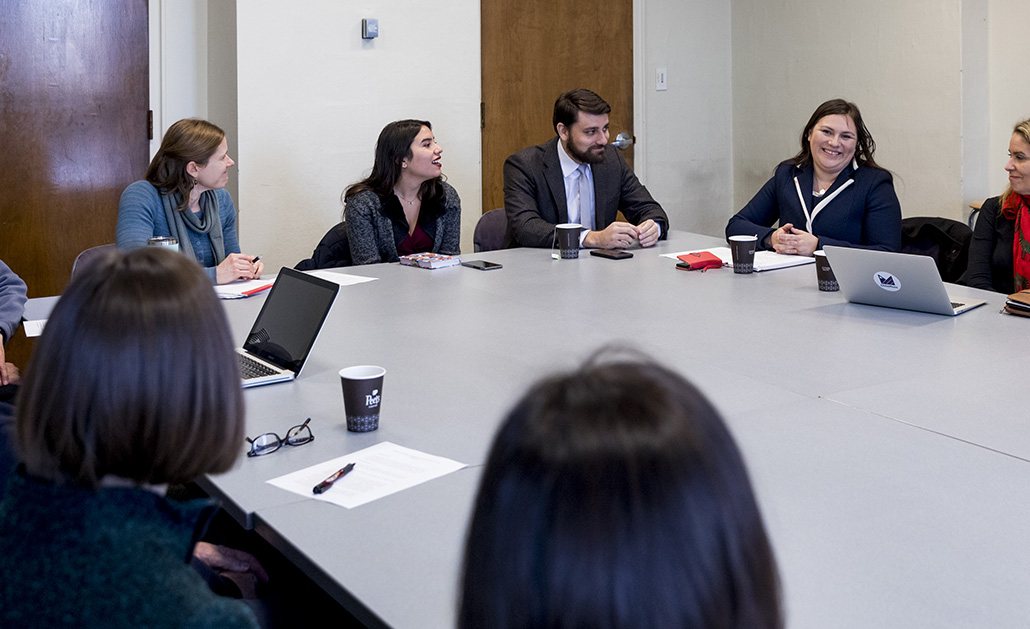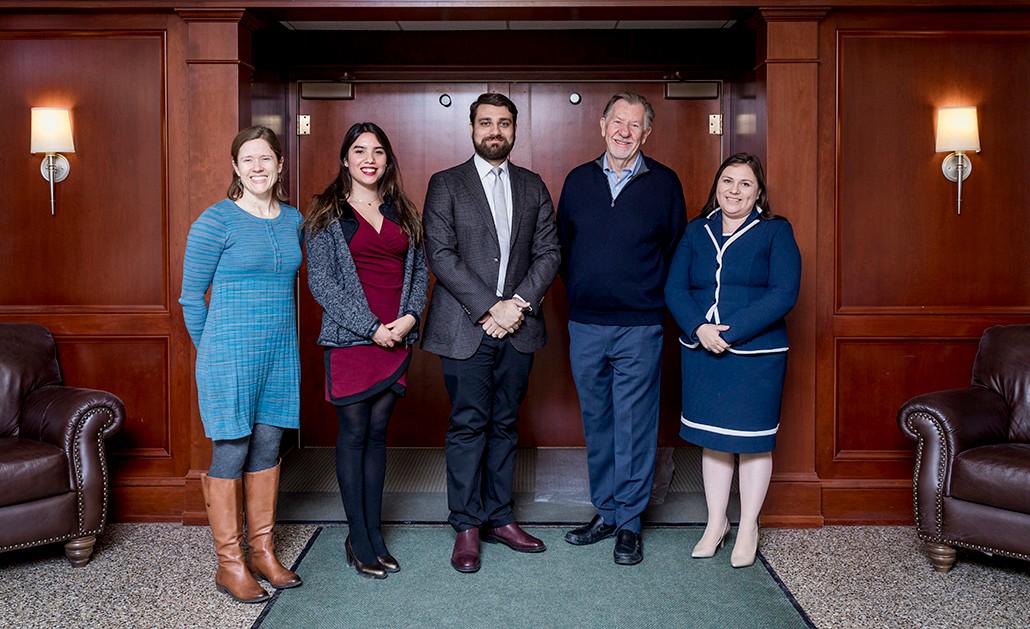
From left: Mary Holper, Estefania Palacios Pizarro, Rodrigo Azócar Simonet, Westy Egmont, and Adela Gómez Trincado
In January, the Boston College School of Social Work (BCSSW) and Boston College Law School (BC Law) hosted colleagues from Pontificia Universidad Católica de Chile’s Law School (PUC Law), including law professors Rodrigo Azócar Simonet and Adela Gómez Trincado, and social worker Estefania Palacios Pizarro. The trio—all of whom work at the PUC Immigration Clinic—were recipients of a U.S. Embassy grant to study best practices from U.S.-based institutions. The focus of their trip: a deep dive into BCSSW and BC Law’s pioneering model of interdisciplinary education.
With the goal of improving their own interdisciplinary clinic model, PUC’s Simonet, Trincado, and Pizarro spent three weeks with BC faculty, staff, and administrators who shared scholarship, advice, and results from their clinical partnerships. Their custom itinerary featured more than 40 events, including classroom and clinic observations, meetings and roundtables with faculty and administrators at BC and other area institutions, visits with local city leaders, and social events hosted by BCSSW and BC Law deans and administrators.
And, although it was their first time at BC, the PUC team’s visit was something of a homecoming. That’s because PUC’s interdisciplinary immigration clinic, founded in 2016, evolved from a partnership between Boston College and PUC that began in 2012. “Other universities in Chile and in nearby countries don’t have this interdisciplinary approach,” says Trincado. “It is amazing to be with people dealing with our same issues. We can finally speak a common language.”
History of a winning model
BC Law’s own interdisciplinary clinic model dates to the 1980s, when they first hired a social worker to work in their clinics. In 2013, they expanded this model by inviting a new partnership with BCSSW. MSW students would conduct their field placements, working alongside BC Law students, in two BC Law clinics: the Immigration Clinic and the Juvenile Rights Advocacy Project. Led by a team of faculty and administrators from both schools—BC Law’s Lynn Barenberg, former law clinics social worker; Clinical Professor and Dean’s Distinguished Scholar Paul Tremblay, director of the Community Enterprise Clinic and former associate dean for experiential learning; Associate Clinical Professor Mary Holper, director of the Immigration Clinic; Clinical Professor Francine Sherman, director of the Juvenile Rights Advocacy Project; Associate Clinical Professor Sharon Beckman, co-director of the Criminal Justice Clinic and the Boston College Innocence Program; BCSSW Associate Professor Westy Egmont, director of the Immigrant Integration Lab; Professor Thomas Walsh, associate dean and director of the MSW Program; and Assistant Dean of Field Education Susan Coleman—the new model aligned with the University’s Jesuit values as well as its commitment to experiential learning modalities.
“The legal clinics were a natural opportunity for partnership within BC,” says Egmont. “We recognized that it would be ideal to have social workers in the clinics assisting the lawyers and legal students, learning with them and offering alternative ways of seeing the client, whose legal issue is part of a more complex human drama.”
The interdisciplinary model gelled almost immediately, with all involved—students, faculty, administrators, and clinic clients—seeing tangible benefits. “We’ve found that the learning really goes both ways,” says Holper. “The law student can see the challenges faced by a social work student who is trying to find housing for a detainee, and the social work student also appreciates the legal challenges of obtaining a green card.”
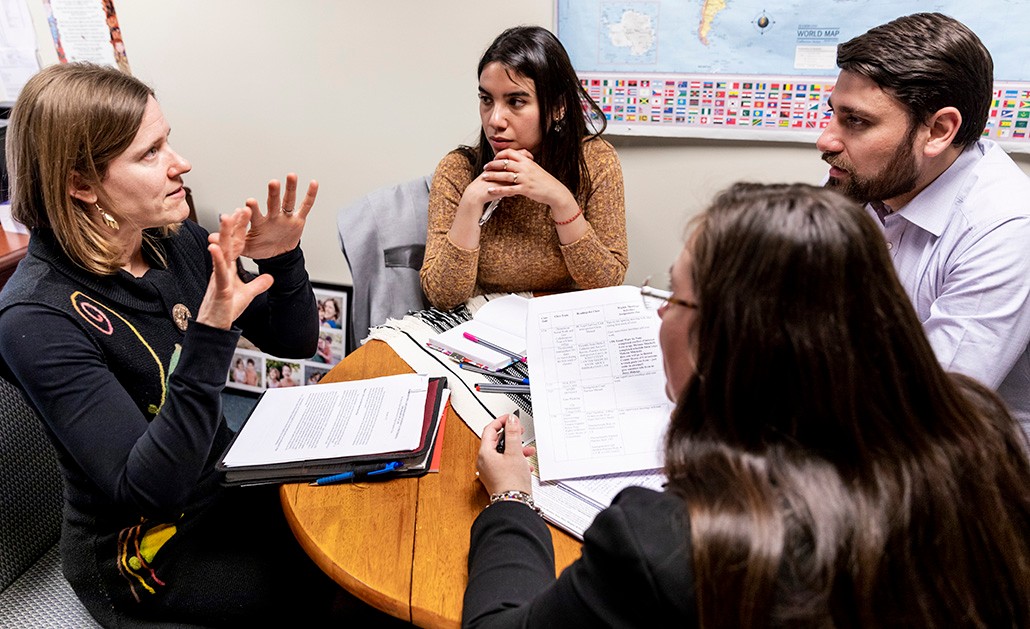
BC Law Professor Mary Holper meets with the Chile delegation.
Seeding a transnational partnership
It wasn’t long before Egmont and Holper, along with BC Law Dean Vincent Rougeau and BC Vice Provost for Global Engagement Alberto Godenzi, former dean of BCSSW and BCSSW professor of global practice, wondered if the prototype could succeed in different legal, cultural, and governmental circumstances.
“I wanted to enhance BC Law’s ability to convene scholars and practitioners from different fields who would build meaningful interdisciplinary partnerships,” recalls Dean Rougeau. “This is how enduring solutions will be found to long-standing legal, social, and public policy problems. I also wanted to enhance the global engagement of our students and faculty. The legal clinic collaboration with PUC provided a great opportunity to invest in a project that would move all of those goals forward.”
PUC, with its commitment to social justice and new focus on clinical education, and with whom the University had entered into a partnership in 2012, was a natural fit. In 2016, PUC faculty members made an inaugural visit to Boston College, followed by a reciprocal visit to PUC by Holper and Egmont.
The two institutions then sought and received a grant from the Luksic Foundation, which funds programs that strengthen and transform secondary education in Chile, and embarked on a new transnational and interdisciplinary exchange. Today, PUC Law School embeds social workers in several clinics, including its immigration clinic, and they conduct intake assessments for more than 1,500 clients a year.
“Our interdisciplinary partnership with BC Law advances student learning and is an important tool for social justice in our communities,” says BCSSW Dean Gautam N. Yadama. “These clinic experiences enable our students to better understand the inherent issues and challenges within each other’s disciplines. As a result, they learn firsthand how a holistic approach can translate into real and sustained gains for community members who are often the most vulnerable in our society.”
Benchmarking best interdisciplinary practices
During their visit, PUC’s Simonet, Trincado, and Pizarro had keen interest in talking with legal and human services professionals who support immigrant populations. BC faculty and staff, several of whom opened both offices and homes for the trio, facilitated their visits with experts on immigration policy and services in private, non-profit, and public sectors throughout Greater Boston.
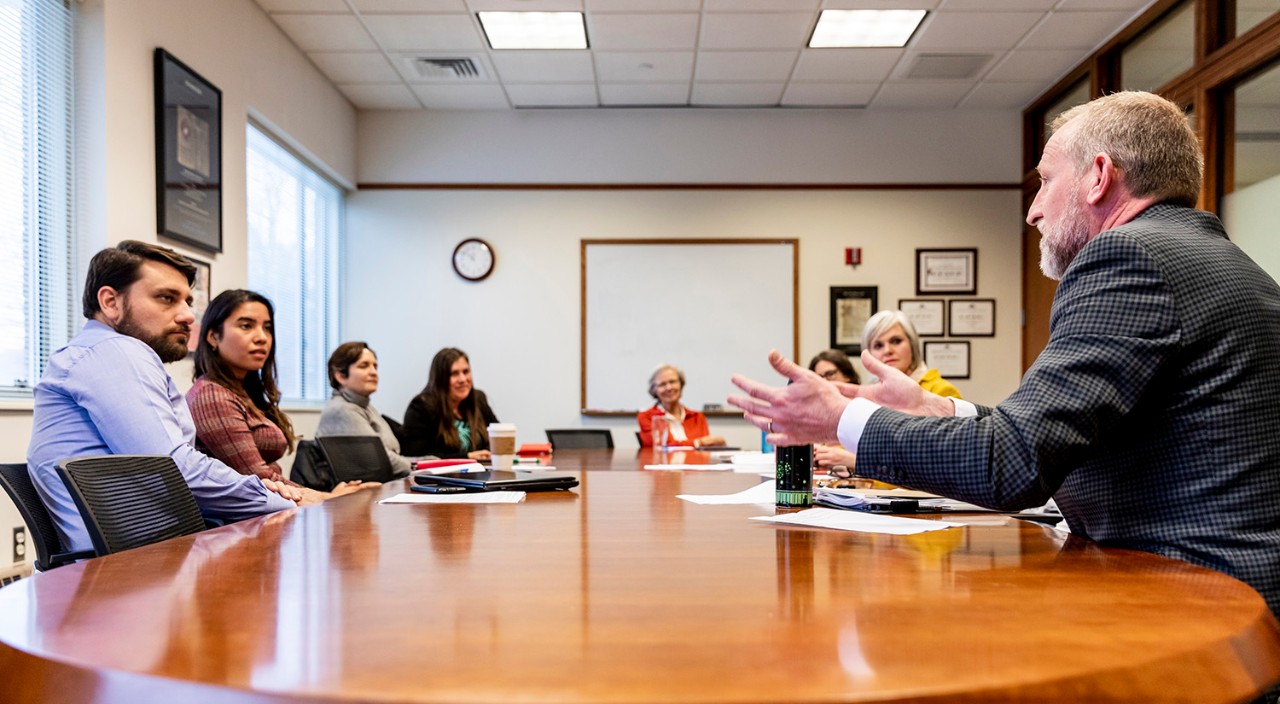
The PUC team meet with staff working in area interdisciplinary law clinics.
The PUC team met with University leaders, including deans Yadama and Rougeau, staff from both schools’ global/international programs, and BCSSW’s field education staff. BC Law Professor and Associate Dean of Experiential Learning and Global Engagement Judith McMorrow and BC Law Assistant Clinical Professor Claire Donohue, JD/MSW ’05, who oversees BCSSW students in the BC Law clinics, convened meetings as well as class visits at the Law School. And Godenzi, with whom the Chileans were familiar due to his long involvement in the partnership, introduced Simonet, Trincado, and Pizarro to Fernanda Soza, a PUC Law and BC Law LLM graduate, who works in BC’s Office of Global Engagement.
Donohue also coordinated two on-campus community conversations for the PUC trio. For the first, she convened staff working in area interdisciplinary law clinics to discuss balancing educational goals for law and social work students. The second gathering featured practitioners and partners from Greater Boston Legal Services, the Committee for Public Counsel Services, and the De Novo Center for Justice and Healing (formerly Community Legal Services and Counseling Center).
Beyond campus events, BCSSW Assistant Director of Field Education Ximena Soto organized and led site visits to local immigrant assistance organizations and Harvard Law School to learn how they integrate social work students into their legal clinics. Soto also coordinated a visit to De Novo, where Simonet, Trincado, and Pizarro heard from a team of social workers and lawyers about their approach to maintaining client confidentiality amid mandated reporting on behalf of the Commonwealth.
To better understand how Boston works with its immigrant residents, Egmont brought Simonet, Trincado, and Pizarro to Boston City Hall. The group met with Marta Rivera, chief of staff at the Mayor’s Office of Health and Human Services, and two staff members in Boston’s Department of Immigrant Advancement: An Le, JD/MSW ’13, the policy and communications advisor, who is also a BCSSW part-time professor, and Carol León, the outreach and community engagement coordinator. They discussed how Boston partners with universities and others to best serve its immigrant population. From city hall, Egmont and the PUC trio headed to the Irish International Immigrant Center in Boston’s financial district to discuss best practices relating to the client intake model, and finished the day with Eva Millona, executive director of the Massachusetts Immigrant and Refugee Advocacy Coalition and BCSSW part-time professor, where they explored ideas for translating experiences into policy recommendations.
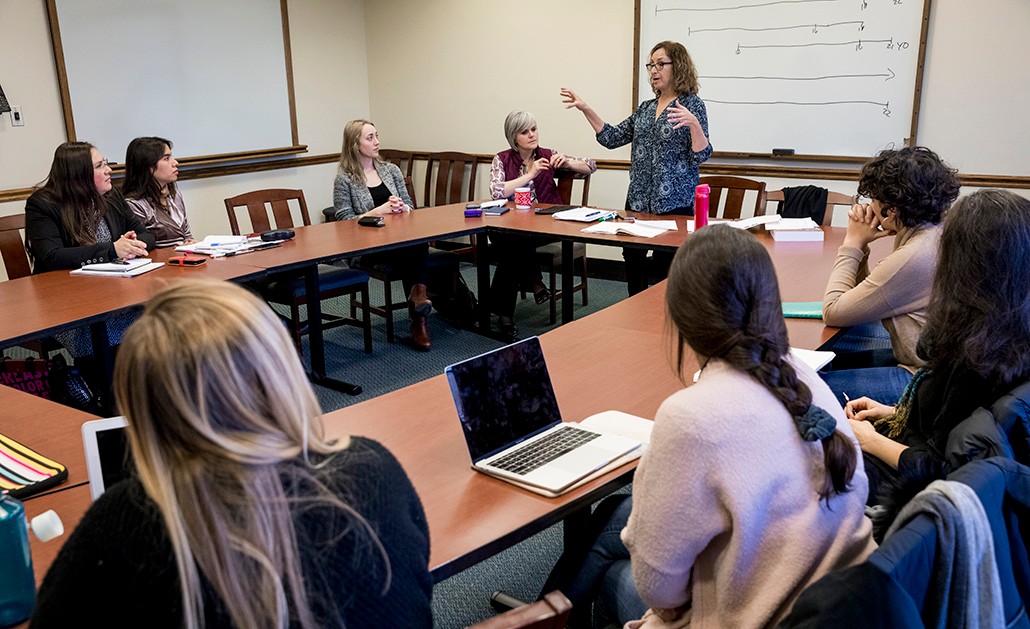
The PUC team attends Clinical Professor Francine Sherman's class.
A new vision for PUC
The PUC team appreciated BC’s efforts to facilitate a bird’s eye view of myriad interdisciplinary partnerships and access to the thought leaders and practitioners behind them. “We came to Boston to observe,” Trincado said, “but we are now finishing the visit by rethinking everything that we have done over these four years. We now go back to Chile with certitude, with a strategic vision for the future.”
That plan includes taking the interdisciplinary approach beyond the clinics and into the curriculum and mission of PUC Law School. “We want this meeting point, of social and legal integration, to become the formation and mode of operation for the education of all attorneys and social workers,” explained Simonet. The team is determined to find new ways of opening their students’ eyes—who must choose their career discipline at the age of 18—to the tactics, skills, and outlook necessary for both fields. “To best serve the client,” said Simonet, “social workers need to understand the language of lawyers, and lawyers need to understand the language of social workers. They need to arrive at a common place.”
“People are complicated—they don’t just have a labor problem or a housing problem or an insolvency problem—they’re all connected,” Trincado says, adding that the trio will return to Chile with renewed energy and a clear mandate: “We need to change the mind-set of our students to see the whole client, so that they can not only be lawyers with the heart of a social worker, but integrated professionals serving the integral person.”
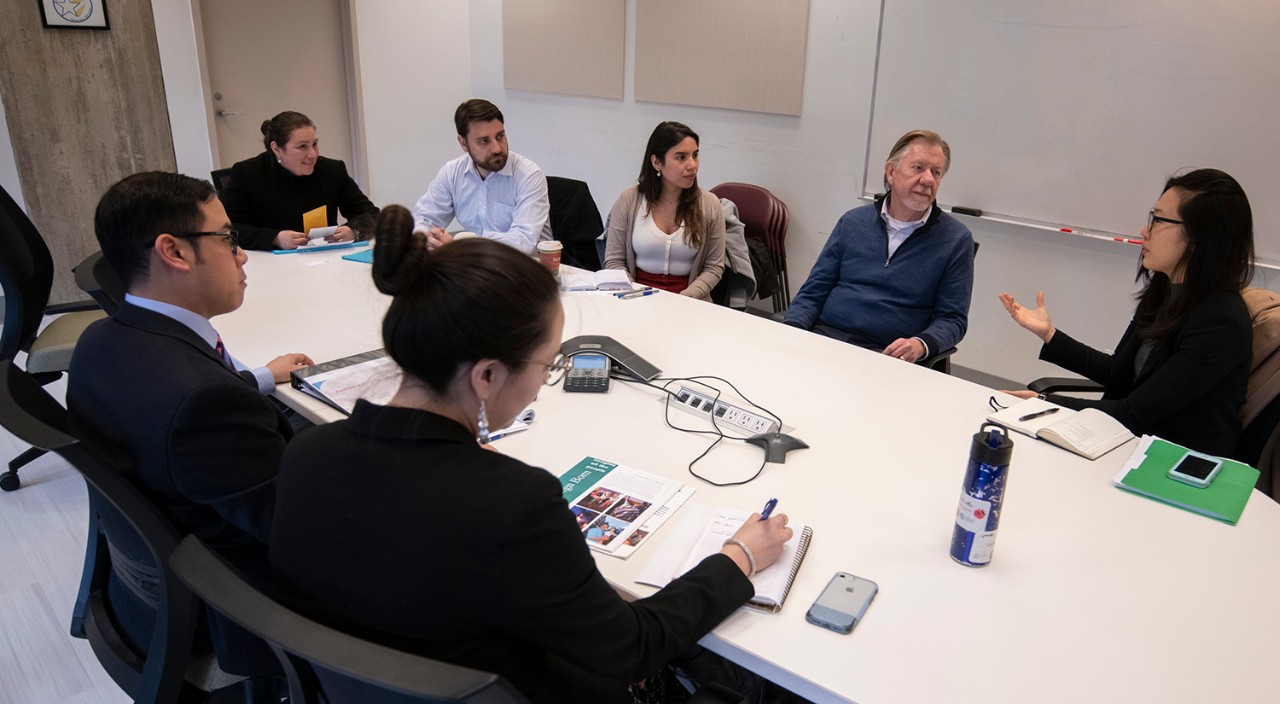
The PUC team meet with staff at the Mayor's office in Boston City Hall.


